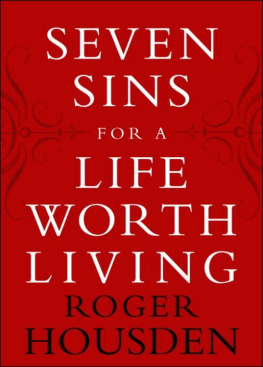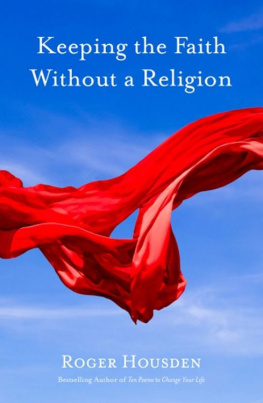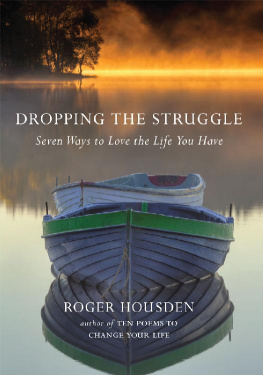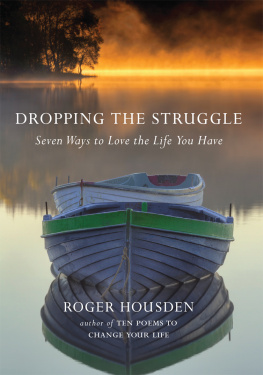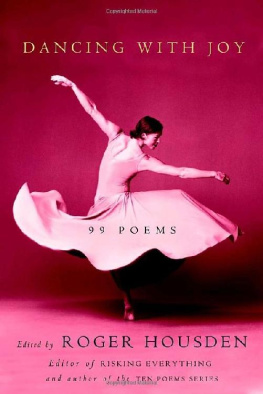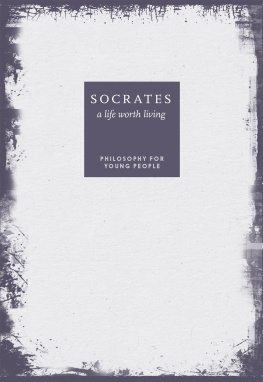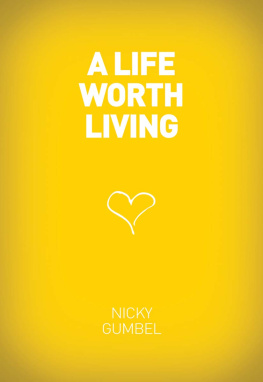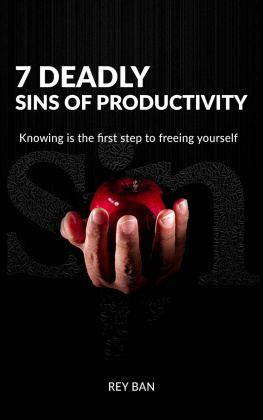Roger Housden - Seven Sins for a Life Worth Living
Here you can read online Roger Housden - Seven Sins for a Life Worth Living full text of the book (entire story) in english for free. Download pdf and epub, get meaning, cover and reviews about this ebook. year: 2005, publisher: Harmony, genre: Religion. Description of the work, (preface) as well as reviews are available. Best literature library LitArk.com created for fans of good reading and offers a wide selection of genres:
Romance novel
Science fiction
Adventure
Detective
Science
History
Home and family
Prose
Art
Politics
Computer
Non-fiction
Religion
Business
Children
Humor
Choose a favorite category and find really read worthwhile books. Enjoy immersion in the world of imagination, feel the emotions of the characters or learn something new for yourself, make an fascinating discovery.
- Book:Seven Sins for a Life Worth Living
- Author:
- Publisher:Harmony
- Genre:
- Year:2005
- Rating:5 / 5
- Favourites:Add to favourites
- Your mark:
- 100
- 1
- 2
- 3
- 4
- 5
Seven Sins for a Life Worth Living: summary, description and annotation
We offer to read an annotation, description, summary or preface (depends on what the author of the book "Seven Sins for a Life Worth Living" wrote himself). If you haven't found the necessary information about the book — write in the comments, we will try to find it.
Seven Sins for a Life Worth Living — read online for free the complete book (whole text) full work
Below is the text of the book, divided by pages. System saving the place of the last page read, allows you to conveniently read the book "Seven Sins for a Life Worth Living" online for free, without having to search again every time where you left off. Put a bookmark, and you can go to the page where you finished reading at any time.
Font size:
Interval:
Bookmark:



contents
For Maria Housden,
who, more than anyone, has helped me appreciate much of what I try to communicate in this book
Did you take pleasure in it?
THE TRADITIONAL LITMUS TEST FOR A SIN ACCORDING TO THE CATHOLIC CHURCH
When you die,
God and the angels
will hold you accountable
for all the pleasures
you were allowed in life
that you denied yourself.
ANONYMOUS
introduction
I met a woman in Georgia once, she was a Playboy bunny, all long legs and heavy mascara. In the town she grew up in, she said, in Tennessee, dancing was against the law. You might have thought America would have learned back in the twenties, in the days of the speakeasy, that prohibition only encourages what it seeks to quell.
Pleasure, especially in countries of a distinctly Puritan persuasion like ours, has had a bad rap for a very long time. Life, so the conventional wisdom goes, is too serious to be taken lightly.
The birth of this country did not arrive on wings of joy. The first generation of settlers included long-faced men in tall black hats who took their life and religion seriously. They didnt have time for smiles of pleasure or sighs of delight. They were too busy working. They were utilitarians; if its not useful, why do it or think it? Good Puritans that they were, work, like cleanliness, was right up there next to godliness. America was built on hard work, and the tradition continues today.
Nothing wrong with that, of course. All this work has got America where it is, and there is no doubt that without the work ethic and the drive to succeed, nothing much of anything would ever have been achieved, discovered, invented, or sold. No books would have been written or masterpieces painted; there would be no Empire State Building or Trump Tower.
Americans are famous for both working and playing hard. We are the most competitive, driven nation on earth. We win far more Olympic gold medals than most other countries put together. Our unique brand of football resembles a modern gladiator contest. Our military devours more dollars than all other aspects of national life combined. The education system itself is a battlefield. Parents jostle to place their infants in the best strategic positions as soon as they are born. Life coaches, fitness trainers, therapists, diet coaches, golf coaches, preschool coaches, even coaches to help you die wellthere are professionals to cheer you through every stage and aspect of life.
The more hours you spend in the office, the more multitasking you can do, the fewer vacations you take, the more your professional and also your social credibility increase in stock. You are a good, productive, and useful person if your diary is crammed for the foreseeable future, and even more so if your e-mail in-box edges past the one-hundred-a-day mark. Your stock soars higher still if you happen to mention that you thrive on four or five hours of sleep a night. Eight hours a night is for losers who have nothing to get out of bed for in the morning.
No wonder America is number one. The desire to achieve the great goal of being a winner begins in the cradle and only stops when you drop. It has produced a nation of incredible achievers. No one else has put someone on the moon. Few others have run faster or played harder. No one else came up with a Google or can equal a Microsoft. No other street in the world has the power of Wall Street. American initiative, enterprise, ingenuity, and sheer persistence are second to none. And when you are not working your career, why, thats no reason to be idle you can work on yourself! You can get a fitter, trimmer body, a more balanced mind, a cleaner spirit. Not only psychological but also spiritual success is just the next frontier when the worlds achievements seem to pall.
Seven Sins for a Life Worth Living goes the other way, against the cultural grain. It claims that a driven life is not much fun, and if theres no pleasure in it, then its hardly worth living. It encourages you to be pleasure-prone. It is a cry for freedom: freedom from the breathless and guilt-laden need to be constantly productive and useful. It is all for a warm, juicy, and satisfying life that is not beholden to righteous beliefs of any persuasion.
Taking pleasure is an attitude more than an activity. These pages celebrate sensual pleasures but also the pleasures of being foolish, of doing nothing useful, of not being perfect, of not knowing, and more.
Pleasure is the food of the soul as well as the senses, sustenance for the spirit as well as the body, since pleasure can lead to delight, which can easily lead to joy, and joy is the upwelling of the human spirit, which always lives and breathes beyond the confines of right and wrong. Energy is eternal delightthe poet William Blake was thinking of just such a joyful upwelling when he wrote that line.
Some pleasures, of course, are culturally encouraged, such as the pleasure of good company and fine wine, or the pleasure of a good book. But there are many more that, for reasons of social or religious probity, have long been deemed unworthy of a responsible member of society. This book specifically aims to revalue and celebrate these guilty pleasures.
Chocolate cake happens to be a favorite of mine, but thats not the kind of guilty pleasure I have in mind. The deepest forms of pleasure are those that fill us with a sense of meaning and joy. You will find here attitudes and ways of being in life that can foster a sense of delight and ease; that can allow us to live life in a more spontaneous and joyful manner. Which does not mean, however, that pleasure always comes easy.
Researchers have distinguished three levels of happiness: what they call the pleasant life, the good life, and the meaningful life. The pleasant is the one based on the experience of instinctual pleasuresraw feelings and sensation thrills. The second is what Jefferson had in mind, speaking of the pursuit of happiness. He was picking up on Aristotles idea of being able to exercise your talents in a favorable environment. Third, the deepest and most pleasurable aspect of fulfillment, or happiness, is a sense of meaning, which always consists in attaching to something larger than ourselves.
Conventional wisdom, however, tells us that nobody goes to heaven for having a good time. We genuinely think pain is virtuous, which is not surprising given that the majority of us worship a crucified Savior. Suffering is a great purifier, a forger of character, no doubt about that, but why make a career out of it when it comes unbidden anyway? True pleasure is a far rarer and thus, one would think, a more precious gift.
The last time you were full of joy (when was that?) you didnt think to debate with yourself whether you were doing the right thing or not. Joy is full-bodied, whole-hearted, all-encompassing. In a moment of joy you are no longer a kingdom dividedbetween right and wrong, this way or that way, should or shouldnt. The divisions, if they do come, come only later, when the moment has passed.
Font size:
Interval:
Bookmark:
Similar books «Seven Sins for a Life Worth Living»
Look at similar books to Seven Sins for a Life Worth Living. We have selected literature similar in name and meaning in the hope of providing readers with more options to find new, interesting, not yet read works.
Discussion, reviews of the book Seven Sins for a Life Worth Living and just readers' own opinions. Leave your comments, write what you think about the work, its meaning or the main characters. Specify what exactly you liked and what you didn't like, and why you think so.

